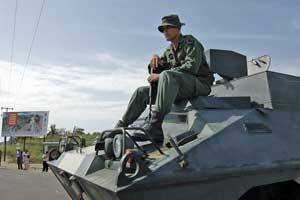A renewed Latin American arms race and the United States’ lack of attention to it has some international policy experts worried. Spending on arms in the region doubled from $24 billion in 2003 to $47 billion in 2008. Latin American nations are purchasing tanks, fighter jets and other military equipment better suited to waging war on their neighbors than the fighting domestic threats like drug trafficking and organized crime.
While Catholic bishops in Guatemala and Mexico have warned about the imminent threat of drug-related violence, little has been said about the military buildup. Underlying the purchases is “profound mistrust and political tension” among Latin American nations, said Michael Shifter, vice president for policy at the nonprofit organization Inter-American Dialogue in Washington, D.C., and a professor at Georgetown University, partly because economic globalization, technology and migration spur countries to defend their national interests. “Compared to 10 or 15 years ago, each country is turning inward more, and each country is more concerned about its national priorities,” he said.
After economic crises in the 1980s and 1990s, many Latin American countries saw unprecedented growth in the past decade and can afford to replace obsolete equipment, said Adam Isacson of the Washington-based Center for International Policy. Nevertheless, Isacson notes, most of the weapons being purchased, from tanks to fighter jets to automatic weapons, “are for scenarios of interstate conflict.”
Isacson said that as events in the Middle East distracted U.S. attention from Latin America, Brazil has emerged as a regional leader and is trying to position itself as a world power. The country has signed a deal with France that includes the purchase of submarines, fighter planes, tanks, missiles and radar equipment. Brazilian politicians have said the country must protect large offshore oil deposits, but President Luiz Inácio Lula da Silva also expressed concern over a U.S.-Colombian agreement allowing the United States to use military bases in that Andean country.
While past U.S. military actions in the region focused on drug interdiction, “the mission is completely broad now,” Isacson said. He noted that the “vague language, secrecy and leaks” that marked the signing of the U.S.-Colombia agreement “were the biggest gift you could give” Venezuela’s President Hugo Chávez. Chávez has, predictably, cited the U.S.-Colombia deal to justify beefing up his country’s arsenal.
President Alan García of Peru called on South American countries to avoid an arms race, sending cabinet members to urge other governments to spend funds to reduce poverty instead of for weapons. But Peru is also negotiating the purchase of naval frigates, and at a military parade in December, it showed off new tanks from China.
With U.S. attention focused on Iraq and Afghanistan, other countries are stepping in to build closer relations with the region, analysts say. President Mahmoud Ahmadinejad of Iran has visited Venezuela, Brazil and Bolivia, and China is striking deals not only to sell military hardware, but also to prospect for minerals and oil.
Isacson said the United States is also paying too little attention to the greatest threat of violence in the region, which he said comes from drug trafficking and organized crime. “I am worried about the next five years in Latin America,” he said. “You’re seeing organized crime taking over governments.” The United States “has to do everything it can to reduce its own demand [for illegal drugs], stop the flow of weapons into the region, and crack down on money laundering.”








